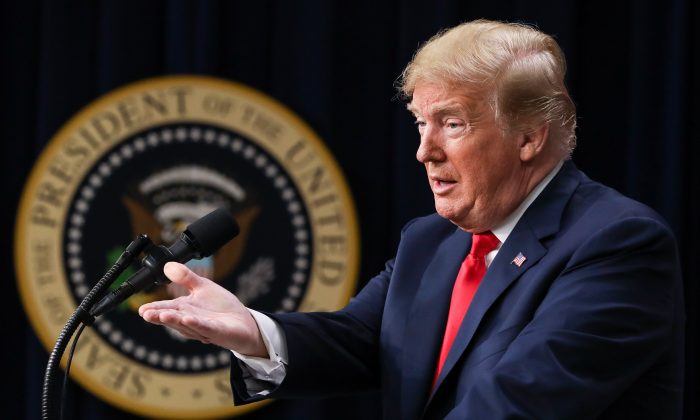American voters tend to approve of President Donald Trump’s handling of the economy, job creation, and fighting terrorism. They find him lacking, though, on immigration, government administration, and foreign affairs, according to a recent Harvard/Harris poll.
Trump attracted the support of 58 percent of registered voters on the issue of stimulating jobs and 57 percent on the economy and fighting terrorism.
The economy has been beating expectations for over a year, with unemployment dropping to 3.8 percent in May, the lowest level since 1969, while job openings for April reached 6.7 million, more than one for each person considered unemployed.
Trump’s lowest mark was on government administration (45 percent), while 46 percent approved of his job on immigration and 47 percent on foreign affairs.
Immigration was at the top of the list one the most important issues the country faces, the poll showed.
Trump has assumed a tough stance against illegal immigration—a position favored by the majority of American voters.
Voters decidedly preferred secure borders to “basically open borders” (76-24), stricter immigration law enforcement vs. looser enforcement (70-30), and 61 percent also considered current border security inadequate.
The voters overwhelmingly opposed separating illegal immigrant families at the border (88-12), but 61 percent said the families should be sent back home and 53 percent said the families should be kept in detention while their cases are being processed.
Also, 63 percent favored the recent Republican immigration reform proposal that gives illegal immigrants brought here by their parents work permits and a path to citizenship in exchange for overhauling the legal immigration standards to increase merit preference over preference for relatives, eliminating the diversity visa lottery, and funding a barrier on the U.S.-Mexico border.
Trump’s overall lower mark on immigration contrasts with general support for his specific policies, but aligns with the negative media coverage he’s received.
As part of the “zero tolerance” policy towards illegal immigration announced in April, the administration has been prosecuting all illegal border crossers. As a result, some 2,000 children were separated from their parents, who brought them into the country illegally.
Normally, in the United States, if an adult is apprehended for a crime, their children do not accompany them to jail. Last year, more than 20,000 children were placed into foster care while their parents were incarcerated.
The separations at the border, however, dominated media coverage for several weeks sparking outrage until Trump signed an executive order to adjust the policy to keep the families detained together.
White House press secretary Sarah Sanders said the solution is only temporary because the government will eventually run out of detention space for families that have been pouring over the border by the thousands, traveling across Mexico from turbulent Central American countries such as Honduras, El Salvador, and Guatemala.
On foreign policy, voters decidedly approved (74 percent) of Trump’s meeting North Korean leader Kim Jong Un. Also, 57 percent believed the meeting “offers a viable path for North Korea to give up its nuclear weapons” rather than being just a diplomatic show.
Almost two thirds (64 percent) also said Trump deserves credit for the meeting.
Trump’s leveraging the threat of tariffs to win more favorable trade terms from nations around the globe was approved by 59 percent. The same percentage supported Trump’s threat of $250 billion in tariffs on Chinese goods and products if China does not take steps to correct its trade deficit with the United States.
On the other hand, voters seem wary of a trade war, fearing it would cost jobs and raise consumer prices. While 55 percent supported imposing tariffs on cars and electronics “to reduce U.S. trade deficits and keep jobs at home,” only 44 percent supported the same move if it increases consumer prices.
Voters were split (51-49) on imposing tariffs on the G7 allies (Canada, France, Germany, Italy, Japan, United Kingdom, and the European Union).
From The Epoch Times
Watch Next:
US Border Patrol: ‘There is no policy to separate families’
The United States Border Patrol on Sunday allowed reporters to briefly visit the facility where it holds families arrested at the southern US border, responding to questions over the Trump administration’s “zero tolerance” policy.

